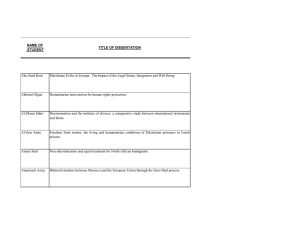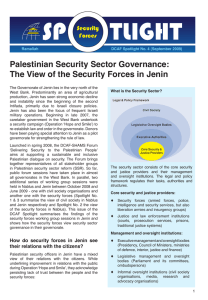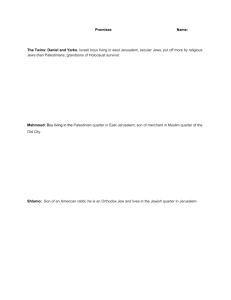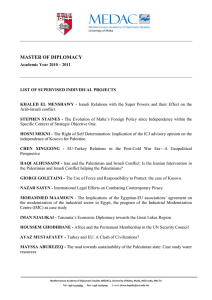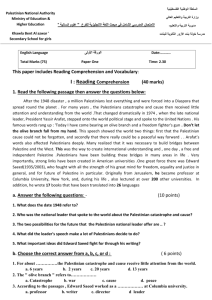SP TLIGHT Civil
advertisement
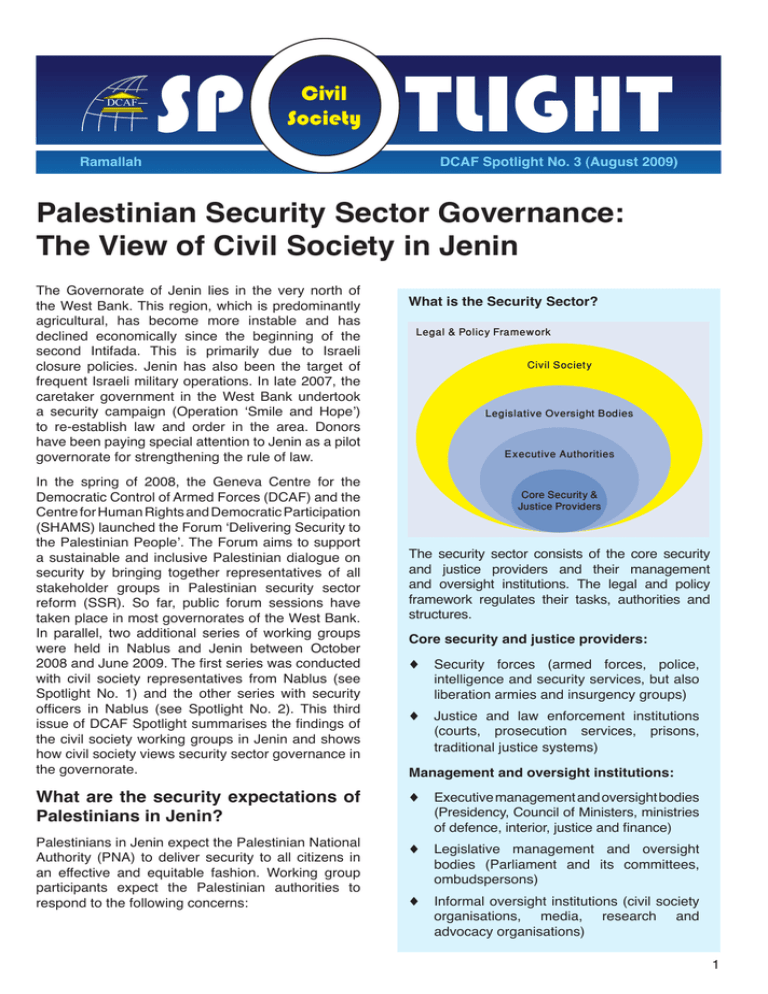
DCAF Ramallah SP Civil Society TLIGHT DCAF Spotlight No. 3 (August 2009) Palestinian Security Sector Governance: The View of Civil Society in Jenin The Governorate of Jenin lies in the very north of the West Bank. This region, which is predominantly agricultural, has become more instable and has declined economically since the beginning of the second Intifada. This is primarily due to Israeli closure policies. Jenin has also been the target of frequent Israeli military operations. In late 2007, the caretaker government in the West Bank undertook a security campaign (Operation ‘Smile and Hope’) to re-establish law and order in the area. Donors have been paying special attention to Jenin as a pilot governorate for strengthening the rule of law. In the spring of 2008, the Geneva Centre for the Democratic Control of Armed Forces (DCAF) and the Centre for Human Rights and Democratic Participation (SHAMS) launched the Forum ‘Delivering Security to the Palestinian People’. The Forum aims to support a sustainable and inclusive Palestinian dialogue on security by bringing together representatives of all stakeholder groups in Palestinian security sector reform (SSR). So far, public forum sessions have taken place in most governorates of the West Bank. In parallel, two additional series of working groups were held in Nablus and Jenin between October 2008 and June 2009. The first series was conducted with civil society representatives from Nablus (see Spotlight No. 1) and the other series with security officers in Nablus (see Spotlight No. 2). This third issue of DCAF Spotlight summarises the findings of the civil society working groups in Jenin and shows how civil society views security sector governance in the governorate. What are the security expectations of Palestinians in Jenin? Palestinians in Jenin expect the Palestinian National Authority (PNA) to deliver security to all citizens in an effective and equitable fashion. Working group participants expect the Palestinian authorities to respond to the following concerns: What is the Security Sector? Legal & Policy Framework Civil Society Legislative Oversight Bodies Executive Authorities Core Security & Justice Providers The security sector consists of the core security and justice providers and their management and oversight institutions. The legal and policy framework regulates their tasks, authorities and structures. Core security and justice providers: ♦ Security forces (armed forces, police, intelligence and security services, but also liberation armies and insurgency groups) ♦ Justice and law enforcement institutions (courts, prosecution services, prisons, traditional justice systems) Management and oversight institutions: ♦ Executive management and oversight bodies (Presidency, Council of Ministers, ministries of defence, interior, justice and finance) ♦ Legislative management and oversight bodies (Parliament and its committees, ombudspersons) ♦ Informal oversight institutions (civil society organisations, media, research and advocacy organisations) 1 Protection against occupation: ♦ ‘No one protects us against the occupiers.’ ♦ ‘The Palestinian Authority is unable to defend itself and its forces against the occupation. How can we expect it to defend the citizens?’ ♦ ‘What can I expect from the security forces when the occupiers break into our houses?’ Rule of law: ♦ ‘I will feel secure when I am able to go to court and have my case heard.’ ♦ ‘I want the security forces to take the people they arrest to court, so that the court can decide on their case and they can defend themselves.’ ♦ ‘Israeli movement restrictions and closures make it impossible to effectively implement the rule of law.’ Respect of citizens’ rights: ♦ ‘Fear prevails. Who can I turn to for protection?’ ♦ ‘As a citizen, can I express my opinion as freely as before? The answer is no!’ ♦ ‘I think there is no freedom of expression. I want to be able to speak freely, but currently I cannot do that.’ ♦ ‘We are scared of the security forces. We do not want to have the same problems as the rest of the Arab world.’ ♦ ‘I do not know how the security forces perceive us. Do they see us as enemies?’ Depoliticisation of the security forces: ♦ ‘We want the security forces to be fully neutral, whether in Jenin or in Gaza.’ ♦ ‘The security forces should stay away from politics. Here, politicians exploit security for personal gains.’ Accountability: ♦ ‘What accountability mechanisms are there against misconduct by the security forces?’ ♦ ‘We need to monitor the security forces’ behaviour, especially their interactions with the population.’ 2 How do Palestinians in Jenin evaluate the performance of the PNA security forces? Civil society in Jenin has a mixed view of the performance of the PNA and its security forces in delivering security to the citizens. While many Palestinians welcome the authorities’ efforts to establish law and order in the governorate, they are critical of what they see as the PNA’s attempts to increase repression and curtail freedoms. Overall, civil society does not trust the PNA’s ability to deliver security services to the people and denounces the arrest practices of the caretaker government. Civil society considers that the Israeli occupation policies are a key obstacle to good governance of the security sector. Many civil society representatives in Jenin are pessimistic about the prospects for sustainable security sector reform. Performance of Security Forces While welcoming the improvement of law and order, civil society thinks that the forces lack professionalism. Some progress in the rule of law: ♦ ‘Collecting weapons is positive. In the past, we used to hear gunshots on a daily basis. This has now stopped.’ ♦ ‘The security forces have been effective in collecting stolen cars, that is true. This problem is solved. But the rule of law is not only about stolen cars.’ ♦ ‘Recently, a murder happened in a village nearby. The security forces managed to arrest the murderer within two days.’ Increased repression: ♦ ‘The situation has become very difficult after the Gaza war. I feel that I cannot express my opinion anymore. I am afraid to speak my mind.’ ♦ ‘Frankly, I do not expect anything from the Palestinian security forces anymore. I witnessed how they treated old people on the streets here in Jenin, insulting them and forcing them into police cars. They verbally and physically abuse the citizens, even the elderly.’ ♦ ‘Why did the security forces kill a young man when they entered Qabatiya during a security operation?’ Lack of professionalism in the security forces: ♦ ‘The tasks of the security forces have not been clearly defined. The main problem is that different security forces are in conflict because their roles overlap. Moreover, they are often guided by personal and factional interests’ ♦ ‘The security forces have disappointed many people by imitating the occupier’s behaviour.’ ♦ ‘The investigating officers are not trustworthy. They rarely have secondary school diplomas and often lack basic training. The police commit many mistakes during investigations. They also lack sensitivity when dealing with the people.’ ♦ ’Both the security forces and the General Prosecution lack professional skills.’ Failure to win the hearts of the people: ♦ ‘We should make a distinction between the police and the other security forces. The police fight crime and regulate traffic. They respond to citizens’ requests, whereas the other security forces do not.’ ♦ ‘I do not see a change in the police. Since the 2007 events in Gaza, the gap between the citizens and the police has increased. Moreover, the police are involved in detaining people.’ ♦ ‘90% of those violating the law belong to either the security forces or a political faction.’ ♦ ‘There should be more transparency. Citizens have a negative perception of the security forces because they lack transparency.’ ♦ ‘We all know about security officers who resold confiscated cars on the market. How can young officers learn to behave properly when their supervisors set such a bad example?’ Performance of Executive Authorities Civil society no longer trusts the Palestinian authorities and fears an increase in repression. Sinking trust in the Palestinian National Authority: ♦ ‘The Palestinian authorities, whether here or in Gaza, have lost the trust of the people.’ ♦ ‘The Palestinian National Authority is only guided by personal interests and does not work for the people.’ ♦ ‘The Authority is not held accountable for discriminating against citizens because of their political affiliation. We wonder where this will lead.’ ♦ ‘The citizens are not confident. They are afraid and uninformed.’ ♦ ‘In Jenin, we all know each other. In times of duress, such as during the Intifada, we defended and supported each other. However, since the deployment of the security forces, people have turned against each other.’ Political arrests by the caretaker government: ♦ ‘Arrests and investigations have become political.’ ♦ ‘What about arrests based solely on political grounds? We do not want to have any civilian brought before military courts.’ ♦ ‘A man who had been detained and ill-treated by the PNA told the security forces that he would flee to Israel if they arrested him again.’ Effectiveness of Oversight Mechanisms According to civil society, civil-democratic oversight mechanisms fail to provide adequate checks and balances. Weak relations between civil society and security forces: ♦ ‘Civil society could help to improve the relations between the population and the security forces by facilitating discussions between them. However, the two sides have not really been talking to each other so far.’ ♦ ‘Many citizens are ignorant about complaint mechanisms. And those who are informed are often scared of using them. I know an old lady who was threatened and assaulted by the security forces. We told her to file a complaint with the governor, but she did not know about the proceedings and was frightened to complain.’ ♦ ‘We need programmes to raise citizens’ awareness of their rights. Here is an example of a citizen who is aware of the role of the security forces: the National Security Forces stopped an unlicensed car and asked for the license. The driver said: “It is not your job to ask for my licence. This is the job of the police.”’ 3 Weak judiciary: ♦ ‘The authorities, and in particular the High Judicial Council, say that 95% of the cases brought before the courts are solved. That is simply not true. And many of the unsolved cases are homicides.’ ♦ ‘We all know that there is a problem between the judiciary and the security forces. The High Judicial Council regularly criticises the interference of the security forces in the judicial system.’ Assessment of Policy Process Civil society thinks the policy-making process does not reflect local needs and lacks strategic direction: Lack of a shared security policy: ♦ ‘The security forces should be able to articulate their purpose. What is their aim? What services do they provide?’ ♦ ‘Are the security forces here to protect Israel or to protect the Palestinian citizens and to establish a state?’ ♦ ‘Over the last months, Jenin security forces have focused on stolen cars and street sellers. But is this really a priority issue?’ Recommendations Many Palestinians in Jenin believe that the authorities need to seriously improve security in the city. They also feel that the Palestinian National Authority and its security forces will likely lose the public’s trust if they do not respond to the needs of the people. Working group participants made a number of recommendations on ways to improve Palestinian security sector governance: ♦ To undertake palpable and sustainable efforts to depoliticise the Palestinian security forces. ♦ To clearly define the roles, responsibilities, jurisdictions and tasks of all security forces. ♦ To review the existing legal framework of the Palestinian security and amend it in view of a civil-democratic vision of security sector governance. On the institutional level: ♦ To strengthen oversight institutions such as the Palestinian Legislative Council (PLC) and the judiciary to hold the Executive and its security forces accountable. ♦ To strengthen public oversight bodies, such as the media and civil society organisations, in order to increase the public accountability of the security forces. ♦ To foster a culture of loyalty to the state, rather than to individual commanders in the security forces. On the operational level: ♦ To put an immediate end to political arrests. ♦ To launch an in-depth training programme for Palestinian security personnel in order to improve their professional skills and their behaviour towards the citizens and to ensure that appointments are based on education and professional skills (the ‘right person occupies the right position’). ♦ To promote a culture of openness and transparency in the security forces in order to reduce nepotism and corruption, and to establish better channels of communication between the security forces and the citizens. On the strategic level: ♦ To devise a national security policy that is shared by all Palestinians and that will guide the Palestinian security sector reform process; such a policy should be formulated in a politically and socially inclusive way and be focused on the security needs of the citizens. DCAF Spotlight publishes concise reports on salient topics of Palestinian security sector governance for local and international SSR practitioners. DCAF Ramallah ♦ Al-Maaref St. 34 ♦ Ramallah ♦ West Bank/Palestine Tel: +972 (0) 2 295 6297 ♦ Fax: +972 (0) 2 295 6295 ♦ www.dcaf.ch 4
